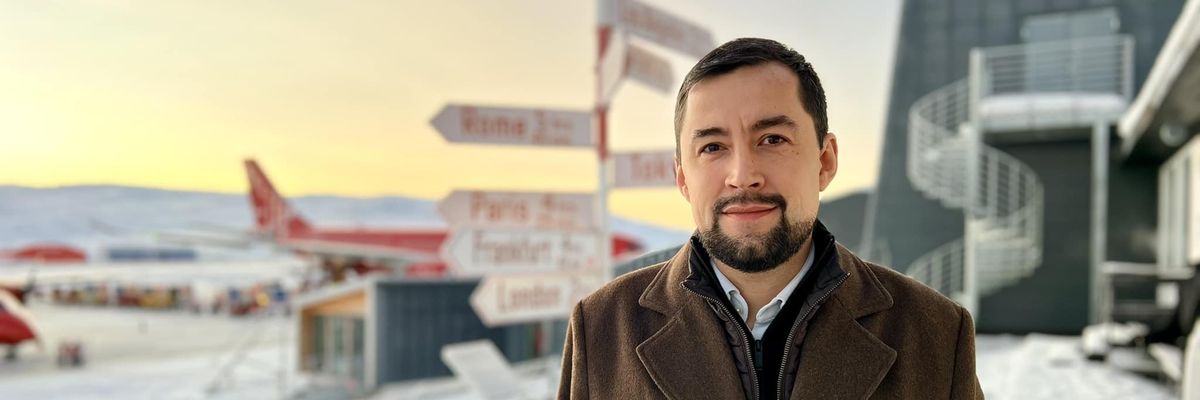
Greenlandic Prime Minister Múte Egede opposes U.S. President Donald Trump's plan to take over the island.
Amid Trump Threat, Greenland Bans Foreign Political Donations Before March Elections
A parliamentary document says the legislation "must be seen in light of the geopolitical interests in Greenland and the current situation where representatives of an allied great power have expressed interest in taking over" the territory.
Faced with repeated threats from U.S. President Donald Trump, who wants to take over resource-rich Greenland, the Danish territory's parliament on Tuesday enacted a ban on foreign political donations, ahead of its March 11 elections.
The new measure—which also bars political parties in the self-governing territory from accepting domestic donations above 200,000 Danish kroner (about $27,700) or 20,000 kroner (about $2,770) from a single contributor—is intended to protect "Greenland's political integrity," The Associated Press reported, citing a parliamentary document translated from Danish.
The document states that the legislation "must be seen in light of the geopolitical interests in Greenland and the current situation where representatives of an allied great power have expressed interest in taking over and controlling Greenland."
According to the AP:
A senior legal officer at Greenland's parliament, Kent Fridberg, told The Associated Press he did not know whether any foreign donors had contributed to Greenland's political parties and the idea for the bill was "basically a preventative measure."
Fridberg noted that some Russian politicians had voiced a similar interest—and that political parties in Greenland are generally funded by public means.
Even before returning to the White House last month, Trump revived his first-term interest in making Greenland part of the United States. In early January, he even refused to rule out using military force to seize both the autonomous island nation and the Panama Canal.
Danish and Greenlandic leaders have forcefully pushed back against Trump's remarks, and polling published last week by a pair of newspapers—Denmark's Berlingske and Greenland's Sermitsiaq—shows that 85% of Greenlanders oppose joining the U.S.
Public opinion polling conducted in Greenland in 2018 has also received fresh attention recently, including from Trump himself. Gustav Agneman, an associate professor of economics at the Norwegian University of Science and Technology, was part of the team that conducted those older surveys, which he discussed in a Tuesday piece for The Conversation.
"Two-thirds of the participants thought that 'Greenland should become an independent country at some point in the future,'" he noted. "Opinions were more divergent regarding the timing of independence. When asked how they would vote in an independence referendum if it were held today, respondents who stated a preference were evenly split between 'yes' and 'no' to independence."
As Agneman detailed:
Each year, Denmark sends a block grant that covers approximately half of Greenland's budget. This supports a welfare system that is more extensive than what is available to most Americans. In addition, Denmark administers many costly public services, including national defense.
This backdrop presents a dilemma for many Greenlanders who aspire to independence, as they weigh welfare concerns against political sovereignty. This was also evident from my study, which revealed that economic considerations influence independence preferences.
For many Greenlanders, the island nation’s rich natural resources present a potential bridge between economic self-sufficiency and full sovereignty. Foreign investments and the associated tax revenues from resource extraction are seen as key to reducing economic dependence on Denmark. Presumably, these natural resources, which include rare earths and other strategic minerals, also help explain Trump's interest in Greenland.
During a January appearance on Fox News, Trump's national security adviser, Mike Waltz, made clear why the Republican has renewed interest in the takeover of the nearby territory, saying: "It's oil and gas. It's our national security. It's critical minerals."
One of the most outspoken critics of Trump's plan is leftist Greenlandic Prime Minister Múte Egede, who supports independence and has said: "Greenland is ours. We are not for sale and will never be for sale. We must not lose our long struggle for freedom."
Announcing the elections for Greenland's parliament, the Inatsisartut, Egede said on Facebook Tuesday that "we are facing an unprecedented and challenging time," and stressed the need "for cooperation and unity" among the island's roughly 60,000 residents.
An Urgent Message From Our Co-Founder
Dear Common Dreams reader, The U.S. is on a fast track to authoritarianism like nothing I've ever seen. Meanwhile, corporate news outlets are utterly capitulating to Trump, twisting their coverage to avoid drawing his ire while lining up to stuff cash in his pockets. That's why I believe that Common Dreams is doing the best and most consequential reporting that we've ever done. Our small but mighty team is a progressive reporting powerhouse, covering the news every day that the corporate media never will. Our mission has always been simple: To inform. To inspire. And to ignite change for the common good. Now here's the key piece that I want all our readers to understand: None of this would be possible without your financial support. That's not just some fundraising cliche. It's the absolute and literal truth. We don't accept corporate advertising and never will. We don't have a paywall because we don't think people should be blocked from critical news based on their ability to pay. Everything we do is funded by the donations of readers like you. Will you donate now to help power the nonprofit, independent reporting of Common Dreams? Thank you for being a vital member of our community. Together, we can keep independent journalism alive when it’s needed most. - Craig Brown, Co-founder |
Faced with repeated threats from U.S. President Donald Trump, who wants to take over resource-rich Greenland, the Danish territory's parliament on Tuesday enacted a ban on foreign political donations, ahead of its March 11 elections.
The new measure—which also bars political parties in the self-governing territory from accepting domestic donations above 200,000 Danish kroner (about $27,700) or 20,000 kroner (about $2,770) from a single contributor—is intended to protect "Greenland's political integrity," The Associated Press reported, citing a parliamentary document translated from Danish.
The document states that the legislation "must be seen in light of the geopolitical interests in Greenland and the current situation where representatives of an allied great power have expressed interest in taking over and controlling Greenland."
According to the AP:
A senior legal officer at Greenland's parliament, Kent Fridberg, told The Associated Press he did not know whether any foreign donors had contributed to Greenland's political parties and the idea for the bill was "basically a preventative measure."
Fridberg noted that some Russian politicians had voiced a similar interest—and that political parties in Greenland are generally funded by public means.
Even before returning to the White House last month, Trump revived his first-term interest in making Greenland part of the United States. In early January, he even refused to rule out using military force to seize both the autonomous island nation and the Panama Canal.
Danish and Greenlandic leaders have forcefully pushed back against Trump's remarks, and polling published last week by a pair of newspapers—Denmark's Berlingske and Greenland's Sermitsiaq—shows that 85% of Greenlanders oppose joining the U.S.
Public opinion polling conducted in Greenland in 2018 has also received fresh attention recently, including from Trump himself. Gustav Agneman, an associate professor of economics at the Norwegian University of Science and Technology, was part of the team that conducted those older surveys, which he discussed in a Tuesday piece for The Conversation.
"Two-thirds of the participants thought that 'Greenland should become an independent country at some point in the future,'" he noted. "Opinions were more divergent regarding the timing of independence. When asked how they would vote in an independence referendum if it were held today, respondents who stated a preference were evenly split between 'yes' and 'no' to independence."
As Agneman detailed:
Each year, Denmark sends a block grant that covers approximately half of Greenland's budget. This supports a welfare system that is more extensive than what is available to most Americans. In addition, Denmark administers many costly public services, including national defense.
This backdrop presents a dilemma for many Greenlanders who aspire to independence, as they weigh welfare concerns against political sovereignty. This was also evident from my study, which revealed that economic considerations influence independence preferences.
For many Greenlanders, the island nation’s rich natural resources present a potential bridge between economic self-sufficiency and full sovereignty. Foreign investments and the associated tax revenues from resource extraction are seen as key to reducing economic dependence on Denmark. Presumably, these natural resources, which include rare earths and other strategic minerals, also help explain Trump's interest in Greenland.
During a January appearance on Fox News, Trump's national security adviser, Mike Waltz, made clear why the Republican has renewed interest in the takeover of the nearby territory, saying: "It's oil and gas. It's our national security. It's critical minerals."
One of the most outspoken critics of Trump's plan is leftist Greenlandic Prime Minister Múte Egede, who supports independence and has said: "Greenland is ours. We are not for sale and will never be for sale. We must not lose our long struggle for freedom."
Announcing the elections for Greenland's parliament, the Inatsisartut, Egede said on Facebook Tuesday that "we are facing an unprecedented and challenging time," and stressed the need "for cooperation and unity" among the island's roughly 60,000 residents.
- Trump Adviser Admits Seizing Greenland Is About Fossil Fuels, Raw Imperialism ›
- Trump Won't Rule Out Military Force to Seize Control of Panama Canal, Greenland ›
- A Whopping 85% of Greenlanders Do Not Want to Become a Part of the US ›
- 'We Are Not for Sale': Greenland Once Again Rebuffs Trump Call for US Ownership ›
- 'This Is Final Proof That He Has Gone Mad': Denmark Mocks Trump's Reported Desire to Buy Greenland ›
- Opinion | Why Does Trump Want to Own Greenland? Good, Old-Fashioned Greed | Common Dreams ›
- Opinion | Greenland Will Never Be for Sale | Common Dreams ›
Faced with repeated threats from U.S. President Donald Trump, who wants to take over resource-rich Greenland, the Danish territory's parliament on Tuesday enacted a ban on foreign political donations, ahead of its March 11 elections.
The new measure—which also bars political parties in the self-governing territory from accepting domestic donations above 200,000 Danish kroner (about $27,700) or 20,000 kroner (about $2,770) from a single contributor—is intended to protect "Greenland's political integrity," The Associated Press reported, citing a parliamentary document translated from Danish.
The document states that the legislation "must be seen in light of the geopolitical interests in Greenland and the current situation where representatives of an allied great power have expressed interest in taking over and controlling Greenland."
According to the AP:
A senior legal officer at Greenland's parliament, Kent Fridberg, told The Associated Press he did not know whether any foreign donors had contributed to Greenland's political parties and the idea for the bill was "basically a preventative measure."
Fridberg noted that some Russian politicians had voiced a similar interest—and that political parties in Greenland are generally funded by public means.
Even before returning to the White House last month, Trump revived his first-term interest in making Greenland part of the United States. In early January, he even refused to rule out using military force to seize both the autonomous island nation and the Panama Canal.
Danish and Greenlandic leaders have forcefully pushed back against Trump's remarks, and polling published last week by a pair of newspapers—Denmark's Berlingske and Greenland's Sermitsiaq—shows that 85% of Greenlanders oppose joining the U.S.
Public opinion polling conducted in Greenland in 2018 has also received fresh attention recently, including from Trump himself. Gustav Agneman, an associate professor of economics at the Norwegian University of Science and Technology, was part of the team that conducted those older surveys, which he discussed in a Tuesday piece for The Conversation.
"Two-thirds of the participants thought that 'Greenland should become an independent country at some point in the future,'" he noted. "Opinions were more divergent regarding the timing of independence. When asked how they would vote in an independence referendum if it were held today, respondents who stated a preference were evenly split between 'yes' and 'no' to independence."
As Agneman detailed:
Each year, Denmark sends a block grant that covers approximately half of Greenland's budget. This supports a welfare system that is more extensive than what is available to most Americans. In addition, Denmark administers many costly public services, including national defense.
This backdrop presents a dilemma for many Greenlanders who aspire to independence, as they weigh welfare concerns against political sovereignty. This was also evident from my study, which revealed that economic considerations influence independence preferences.
For many Greenlanders, the island nation’s rich natural resources present a potential bridge between economic self-sufficiency and full sovereignty. Foreign investments and the associated tax revenues from resource extraction are seen as key to reducing economic dependence on Denmark. Presumably, these natural resources, which include rare earths and other strategic minerals, also help explain Trump's interest in Greenland.
During a January appearance on Fox News, Trump's national security adviser, Mike Waltz, made clear why the Republican has renewed interest in the takeover of the nearby territory, saying: "It's oil and gas. It's our national security. It's critical minerals."
One of the most outspoken critics of Trump's plan is leftist Greenlandic Prime Minister Múte Egede, who supports independence and has said: "Greenland is ours. We are not for sale and will never be for sale. We must not lose our long struggle for freedom."
Announcing the elections for Greenland's parliament, the Inatsisartut, Egede said on Facebook Tuesday that "we are facing an unprecedented and challenging time," and stressed the need "for cooperation and unity" among the island's roughly 60,000 residents.
- Trump Adviser Admits Seizing Greenland Is About Fossil Fuels, Raw Imperialism ›
- Trump Won't Rule Out Military Force to Seize Control of Panama Canal, Greenland ›
- A Whopping 85% of Greenlanders Do Not Want to Become a Part of the US ›
- 'We Are Not for Sale': Greenland Once Again Rebuffs Trump Call for US Ownership ›
- 'This Is Final Proof That He Has Gone Mad': Denmark Mocks Trump's Reported Desire to Buy Greenland ›
- Opinion | Why Does Trump Want to Own Greenland? Good, Old-Fashioned Greed | Common Dreams ›
- Opinion | Greenland Will Never Be for Sale | Common Dreams ›

